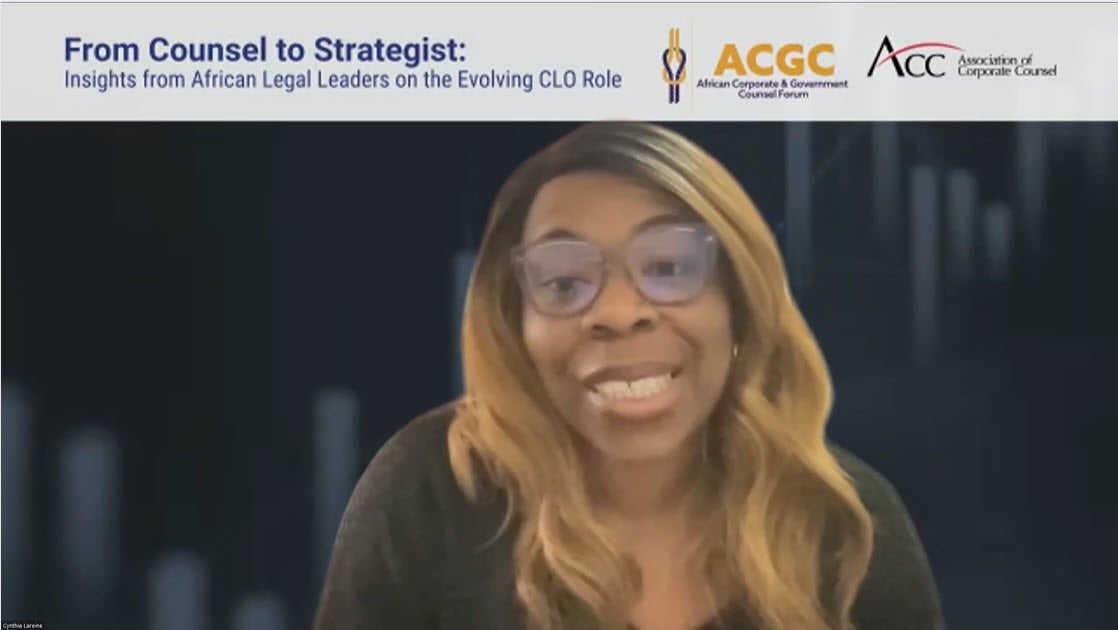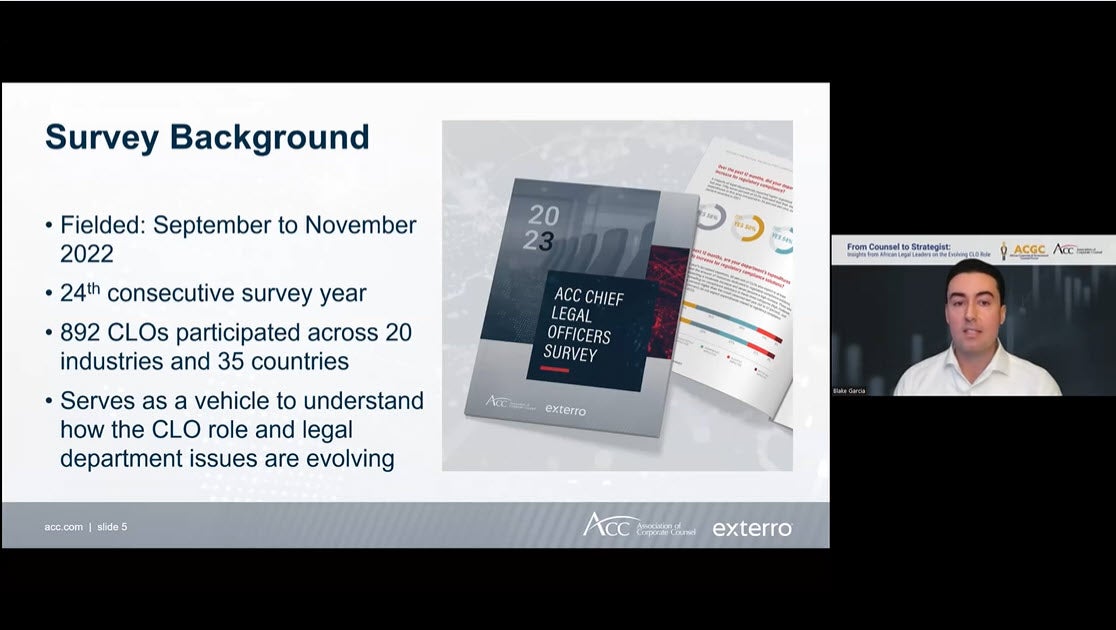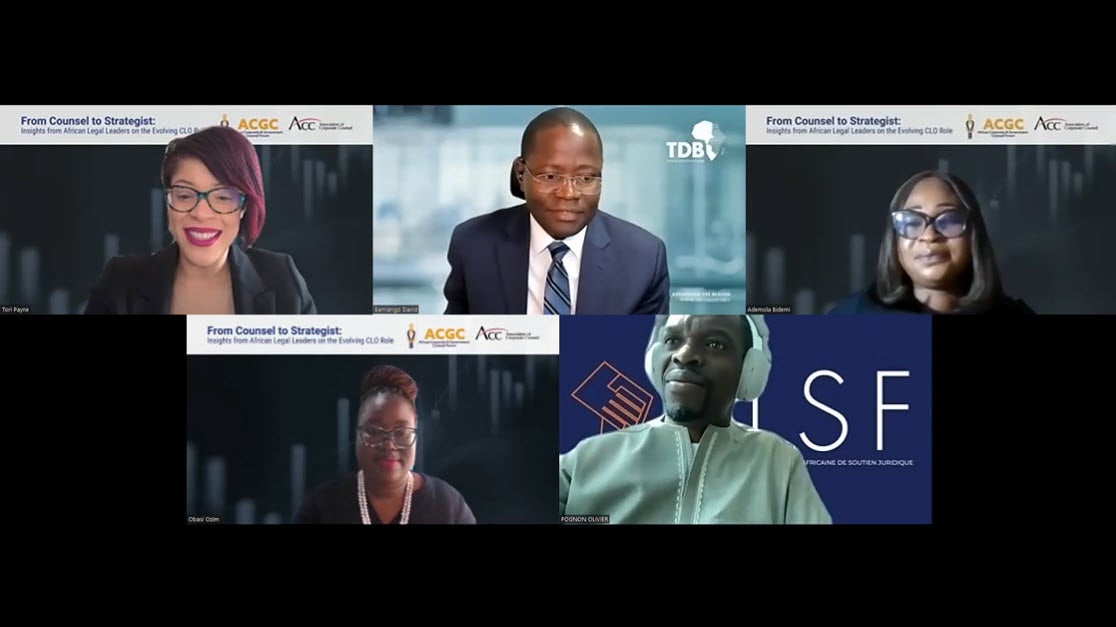Banner artwork by Victor Moussa / Shutterstock.com

Joining ACC in their first joint webinar, Cynthia Lareine, co-founder of ACGC (African Corporate & Government Counsel Forum), kicked of the program noting the purpose of the counsel — to amplify the voices, experiences, and insights of African lawyers in a global context. Together, the two organizations provide a platform for senior in-house counsel leaders to share views and perspectives on the measures they take to succeed, face current challenges, and what to look forward to in the future.

Senior Director of Research and Business Intelligence at ACC Blake Garcia briefly summarized key findings from ACC's Chief Legal Officers Survey, including the current state of the legal department and the evolution of the CLO role. The annual survey, in its 24th year, is conducted between September and November, and published in January. This year’s survey featured responses from close to 900 chief legal officers (CLOs) located in over 35 countries.
Below are three key themes from the report:
- CLOs, especially those who report directly to the CEO, are achieving greater influence within their organizations.
- Data privacy is a top business concern.
- Pressure to reduce costs and demonstrate value continues.
ACC Vice President and Chief Global Officer Tori Payne facilitated the program, and introduced four exemplary panelists:
- David Bamlango – Member of the ACC Global Board of Directors, and General Counsel and Senior Executive, Eastern and Southern African Trade and Development Bank (Kenya)
- Abidemi Ademola – General Counsel West Africa & Company Secretary, Unilever West Africa Cluster (Nigeria)
- Ozim Ifeoma Oseloka Ibeziako – Executive General Counsel, GE Power (Ghana)
- Olivier Pognon – Director & CEO, The African Legal Support Facility (Ivory Coast)

When asked what keeps him up at night, David Bamlango reflected on two important emerging issues in the international bank industry — the heightened sanction and regulatory global environments in which they are operating and cybersecurity and data privacy management. Bamlango wants to ensure his company is, “staying compliant and making sure they are secure in their systems.”
Ademola spoke about the challenge of “finding the right talent.” She is looking for talent with technical and legal skills, combined with commercial and business acumen, to effectively partner various functions and teams across the organization. Ademola values the ability to know how to effectively balance increasing legal costs while keeping abreast of an ever-changing legal regulated landscape.
Working in over 23 countries can sometimes be a hassle when educating international partners. Oseloka experiences some key issues — working through different language barriers throughout multiple regions in Africa, the everchanging legal system, finding effective law firms with solutions, and access to clauses.
In addition to retaining and attracting talents, financial sustainability is one of the main concerns for Olivier Pognon’s organization.

Olivier Pognon believes it is essential to “find talent that shares the same passions and sense of commitment and dedication.”
To address issues surrounding cost management and pressures to demonstrate greater value, Bamlango hired paralegals to support the work of lawyers, so they can allocate their time to other important matters and implemented an operational merger for the legal department to provide leadership to his strategy. Bamlango and Abidemi both deploy legal management and other technology tools such as a document comparison/management, contract management, compliance management, and an automated billing system to save on legal costs and streamline daily functions. In this way, they both improved efficiencies across the organization and legal department.
Ozim Ibeziako understands that constant engagement with stakeholders, knowing who they are working for, and what they do is imperative so her organization can be fully supportive. Building relationships can help mitigate risks in various business functions to improve client satisfaction.

Pognon measures difficulty in assessing or demonstrating value in sound legal advice. Sound legal advice enables investment to flow in. Forums, contract management tools, and legal operations functions are key to monitor and evaluate the productivity of work in this corporation.
Abidemi has created and shared a score card with business leaders for discussion during her monthly goal and governance meetings. They dive into legal matters and seek the help they’re looking for to create a harmonious legal department with business partnering. Receiving constructive feedback and using this approach has helped address a plethora of legal matters.
Forums, contract management tools, and legal operations in functions are key to monitor and evaluate the productivity of work in this corporation.
Hosting regular “brown bag lunch” sessions free of charge to train clients and business partners on legal issues is something Bamlango has implemented so that others have a better understanding of current developments from a legal standpoint. This way, clients can understand their perspective and be better users of legal services. He trains his lawyers how to be business partners, sending them to outside/external trainings, so that they can be able to communicate with business clients in an effective manner. Getting lawyers licensed and certified through the ACC certification program is one of the ways he is creating solutions for his organization.
Transitioning to distinct roles can sometimes be a challenge. Pognon gave the audience insight on what helped him make a smooth transition from chief legal officer to CEO. He stated that his transition was a “combination of factors and luck.” Enabling in-house counsel to understand the business beyond their roles opens doors or opportunities in careers. He moved to an in-house corporation, and in the few years he was there, he felt his impact was limited because of his knowledge of finance. He trained and educated himself in the appropriate areas, so that he could create a space for opportunity. When the opportunity arose, Pognon was ready and knew his purpose was to help make a difference in the organization.
Enabling in-house counsel to understand the business beyond their roles opens doors of opportunities in careers.
Communication and leadership were the most important skills needed to be successful, according to the 2023 CLO report. Pognon strongly believes that effective communication, demonstrating leadership, ownership, accountability, trust, and being a business enabler are all important skills in-house counsel should possess.
The last question posed follows the current AI trend as it pertains to how its implementation in legal departments. Ademola mentioned that she uses AI in her department through E-billing and contract management life cycle tools.
The first webinar between ACGC and ACC offered insights, tips, and strategies for how to effectively manage a legal department in senior leadership roles. Thank you to our great panelists!
Disclaimer: The information in any resource in this website should not be construed as legal advice or as a legal opinion on specific facts, and should not be considered representing the views of its authors, its sponsors, and/or ACC. These resources are not intended as a definitive statement on the subject addressed. Rather, they are intended to serve as a tool providing practical guidance and references for the busy in-house practitioner and other readers.




